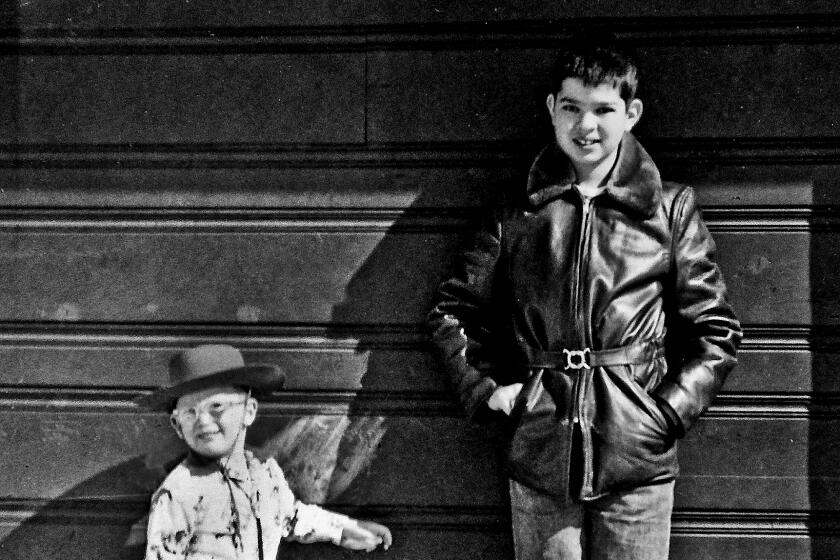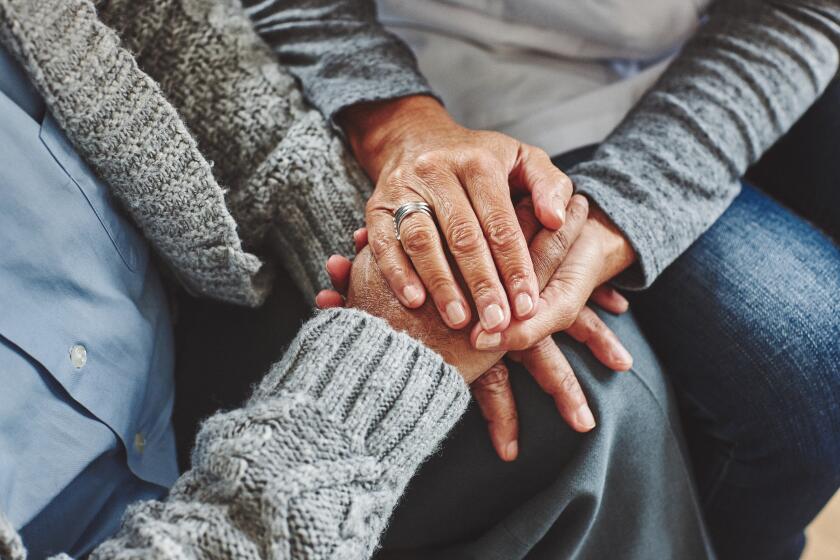Op-Ed: How I learned to stay present while living in the mystery of grief

- Share via
“Is he your first?” people ask when they see me with our son, and I don’t know how to answer.
“Not really,” I say, which confuses people. “We were foster parents,” I add, which often confuses them more.
My husband Eric and I brought our foster daughter, Coco, home from the hospital when she was three days old and weighed less than five pounds. For ten months our home was the only home she knew, until the state of Idaho reunified Coco with her birth mother.
A year and a half later, Eric and I adopted our son. We were chosen by his birth mother to be his parents. We were at the hospital when he was born. During our very first interview with our social worker at the adoption agency, she said, “Tell me about your grief.” I assumed she was talking about the fertility struggles many people who enter the adoption process experience.
“We didn’t have fertility issues,” I told her.
“I know,” she said. “I’m talking about the loss of your foster daughter. I’m talking about your disenfranchised grief.”
As I followed every lead, my brother Mike grew more and more real, more and more a person to me, a singular human worthy of more than a clinical psychiatric summation.
I’d never heard that phrase before, disenfranchised grief, to describe what I had been feeling since Coco left our home — a sorrow that is not openly acknowledged, not socially accepted, not publicly mourned. Relief came with having language for it.
We live in a small mountain town and after Coco was reunified with her birth mother, most of our community supported us in our grief, but not everyone. “Where’s the baby?,” a woman once asked me in the grocery store, and when I told her that Coco wasn’t with us anymore, that she was back with her mother, that I was bereft, the woman said, “But you always knew she would leave, right?” — as if knowing should somehow have lessened our pain.
“That grief will make you better adoptive parents,” our social worker said at that first meeting. She explained that it would connect us to grief our child might feel about the loss of their birth parents and could help us understand the grief the birth parents might feel about their choice to place their child for adoption.
Social scientist Pauline Boss created the term “ambiguous loss” to define “the unclear — and often unacknowledged — absences in [people’s] lives.” This can include people whose loved ones disappear in a natural disaster whose bodies can’t be found, people caring for loved ones with dementia — and the experience of living through a pandemic.
I couldn’t slow cancer’s march through my Dad’s body. But I could surrender to the gifts of seclusion and quarantine time. Our last time together.
It also applies to parents grieving their lost children, no matter the circumstance behind the loss.
Some of the most frequently asked questions about parenting — Is he your first? Do you have kids? Is he yours? — should be reframed to be more open-ended. Questions without yes or no answers — What has motherhood been like for you? Tell me about your family. How is parenting? — give more room for those experiencing a wide swath of emotions to respond. They make space for us to talk about what we’re living through.
When Coco was with us, her mother had received help from the state, including financial assistance and support from social workers and mental health professionals so that she could eventually be reunited with her daughter. But after the reunification happened those supports were phased out and her home once again became too dangerous. Child Protective Services removed Coco from her mother’s home a second time a year after they had been reunited. Knowing this adds another layer to our unknowns, even more ambiguity to our grief.
Our son is now the age that Coco was when we had to give her back to her mother. He plays with the same toys, is learning to eat with the same bowls, spoons and sippy cups. He sleeps in the same crib.
Coco lived with us for 286 days. Day 287 of our son’s life will be a brand new parenting experience for me.
Most of us haven’t been taught how to stay present while living in the mystery of grief — nor how to ask other people about their experience of it. I sometimes wish we lived in a culture where grieving people wore different color clothing, where we were marked in some way, our loss made visible. But then I remember that everyone would be wearing the same thing.
“If he your first?” a new nurse asked Eric and me at our son’s most recent wellness check.
“No,” Eric and I said at the same time. And then, “Yes.”
Sarah Sentilles is a writer living in Idaho. Her latest book is “Stranger Care: A Memoir of Loving What Isn’t Ours.”
More to Read
A cure for the common opinion
Get thought-provoking perspectives with our weekly newsletter.
You may occasionally receive promotional content from the Los Angeles Times.












